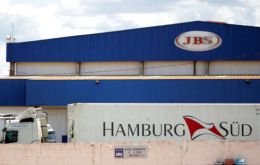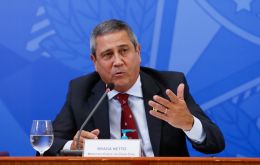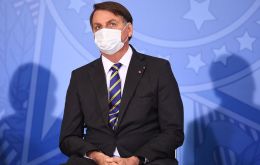MercoPress. South Atlantic News Agency
Brazil
-
Wednesday, August 5th 2020 - 08:07 UTC
For the fifth week running Brazil central bank survey reveals increased optimism on the economy

The gloom surrounding Brazil’s economy lifted for a fifth week in a row, a central bank survey of economists showed on Monday, with the average forecast for 2020 gross domestic product now showing a decline of 5.7%.
-
Wednesday, August 5th 2020 - 07:54 UTC
Brazil: controversy as to when the country's labs can start making Covid-19 vaccines

Brazilian officials say they can start making COVID-19 vaccines developed by British and Chinese researchers within a year. Experts say it will take at least twice as long, leaving Brazil reliant on imports to slow the world's second-worst outbreak.
-
Wednesday, August 5th 2020 - 07:48 UTC
Itaipú dam generates more power to help Paraguayan barges with soybeans reach the River Plate

Just over two months after completing a special outflow to increase the level of the drought-stricken Paraná River, the world largest operational hydroelectric dam, Itaipu, located on the border of Brazil with Paraguay, will increase energy production to help sailing along the huge South American water artery.
-
Tuesday, August 4th 2020 - 10:29 UTC
Major assets' management fund drops JBS shares based on the Brazilian company environment record

Nordea Asset Management has decided to exclude shares of JBS SA worth about 40 million Euros from all of its funds this month based on the company’s environmental record and response to the COVID-19 pandemic, according to a statement released on Tuesday.
-
Tuesday, August 4th 2020 - 10:29 UTC
Seventh Brazilian minister, chief of staff, tested positive for Covid-19

Brazilian President Jair Bolsonaro's chief of staff, Army General Walter Souza Braga Netto, has tested positive for COVID-19, his office said on Monday (Aug 3), becoming the seventh Brazilian minister to have contracted the disease.
-
Tuesday, August 4th 2020 - 10:20 UTC
Ship with Brazilian soybeans arrives in China with several crew members Covid-19 tested positive

According to the Agricensus Agency, a load of Brazilian soy exported to northern China was detained on July 25 because ten crew members aboard a ship from Rio Grande do Sul have tested positive for Covid-19.
-
Monday, August 3rd 2020 - 10:58 UTC
LATAM to lay off another 2,700 crew after failing an agreement with the union

Latin America's biggest airline, the Brazilian-Chilean group LATAM, said it was laying off at least 2,700 crew to cope with the devastating effects of the coronavirus pandemic on the aviation industry.
-
Monday, August 3rd 2020 - 10:56 UTC
Bolsonaro claims he's fully recovered from Covid-19 but has “mouldy lungs”

Fresh off a bout of Covid-19, President Jair Bolsonaro said that nearly everyone will probably end up catching the new coronavirus urging Brazilians to “face up to it” and saying there was nothing to fear. He also admitted taking antibiotics since he was suffering from “mouldy lungs”
-
Monday, August 3rd 2020 - 10:02 UTC
Facebook puts a global block on hate speech from Bolsonaro supporters, but will appeal jurisdiction to the Supreme Court

Facebook said on Saturday it has put a global block on certain accounts controlled by supporters of Brazil's President Jair Bolsonaro implicated in a fake news inquiry, a day after it was fined for not complying with a Supreme Court judge's order to do so.
-
Saturday, August 1st 2020 - 06:27 UTC
Brazil expects a record soybean harvest of 130 million tons

Brazil’s soybean production in 2020/21 is expected to jump to a record 130 million tons, with good prices driving farmers to increase planting in pasture areas after a drought reduced the harvest in the south of the country in 2019/20.
